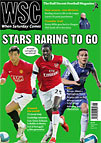 Joao Pinto, one of Portugal's feted 'Golden Generation' and the scourge of England in 2000, has retired. Phil Town looks back at his career
Joao Pinto, one of Portugal's feted 'Golden Generation' and the scourge of England in 2000, has retired. Phil Town looks back at his career
So farewell, then, João Vieira Pinto. The diminutive forward has retired at the age of 36 after a colourful career that started stratospherically, with two World Cup winner’s medals at Under-20 level nearly two decades ago. Among the highs along the way was a glorious display and hat-trick in Benfica’s 6-3 away crushing of Sporting in 1994 – for which JVP was awarded an unprecedented 10 out of 10 by sports daily A Bola – and that sublime headed goal against England at Euro 2000. The lows included an ignominious exit from Benfica in 2000 – he was considered surplus to requirements by the subsequently disgraced club president João Vale e Azevedo – and a six-month ban from football after punching referee Angel Sanchez in the defeat against South Korea in 2002, an aberration that effectively ended his international career.
The blond-haired Menino de Ouro – Golden Boy – was part of the so-called Golden Generation, a nucleus of players brought together by Carlos Queiroz in the late Eighties and early Nineties that would be the backbone of the Selecção for more than a decade. The two World Cup wins – in Riyadh in 1989 and Lisbon in 1991 – were the springboard to success for a number of players. From the 1989 Riyadh squad emerged JVP, Fernando Couto, who went on to represent Portugal at senior level 110 times, and Paulo Sousa, who enjoyed great success abroad, winning two Champions League medals with Juventus and Borussia Dortmund.
Two years after Riyadh, Portugal retained the World Cup trophy at Benfica’s old Luz stadium in front of 127,000 – the largest attendance at a FIFA match after the 1950 World Cup in Brazil – beating a Brazil side including Roberto Carlos and Élber on penalties.
Many of the team from the triumphant Luz final did not have glittering careers. Goalkeeper Brassard, for example, represented only minor Portuguese clubs before becoming goalkeeping coach for the Selecção; forward Gil lost his way then surfaced as a youth-team coach at Manchester United; official player of the tournament Emílio Peixe made some bad career choices, suffered a series of injuries and is now with the Footballers’ Union, coaching out-of-work players; and, after so-so spells at Porto and Sporting Braga, striker Toni ended up working on construction sites in Luxembourg.
But others were destined for great things. Jorge Costa became a dominant figure at Porto, lifting the Champions League in 2004 under José Mourinho. O Maestro Rui Costa spent the bulk of his career in Italy with Fiorentina and AC Milan before returning home to Benfica to finish playing and take on his current role as director of football. And the most successful Portuguese footballer since Eusébio, Luís Figo, earned a record 127 caps for Portugal and was voted FIFA World Player of the Year in 2001.
Despite the individual quality of the players, however, “Golden Generation” proved to be something of a misnomer at a group level. Failure to qualify for the World Cup in 1994 was just one of a number of instances of underachievement that were to dog a Selecção studded with Riyadh/Lisbon heroes: they were knocked out by a Karel Poborsky chip at the quarter-finals of Euro 96; they again failed to qualify for the World Cup in 1998; they fell to France in the semis of Euro 2000, with Abel Xavier’s poorly disguised handball leading to a penalty, pushing, shoving, dissent, and suspensions for several players. And they failed at the group stages in the 2002 World Cup, amid scenes in the defeat to South Korea that would not have been out of place around Friday night kicking-out time at the Dog and Duck.
By Euro 2004, only Fernando Couto, Rui Costa and Luís Figo of the Golden Generation were still representing the Selecção. With the retirement of João Pinto, only Luís Figo, Fernando Couto and Abel Xavier – assuming the last named finds a new club after being released by LA Galaxy – continue to play at the top level.
But as the old gold supply dwindles, things have come full circle. Carlos Queiroz has returned as national coach and it will be interesting to see if he can work his alchemy again to uncover a new Golden Generation, but one that can shine a bit more brightly as a Selecção this time around.
From WSC 259 September 2008